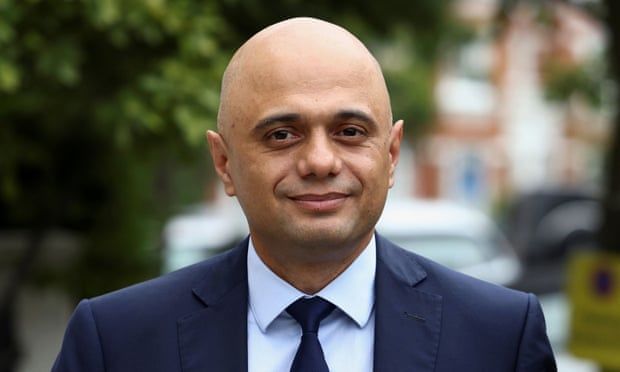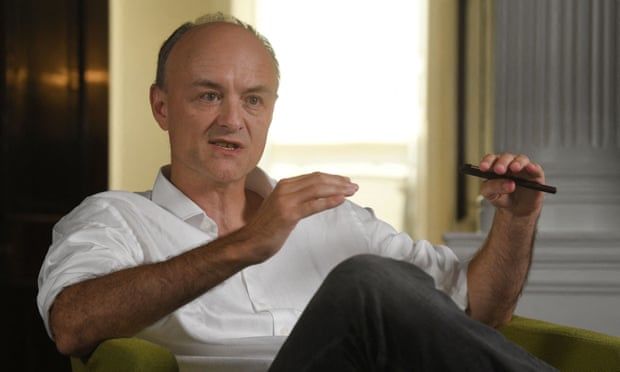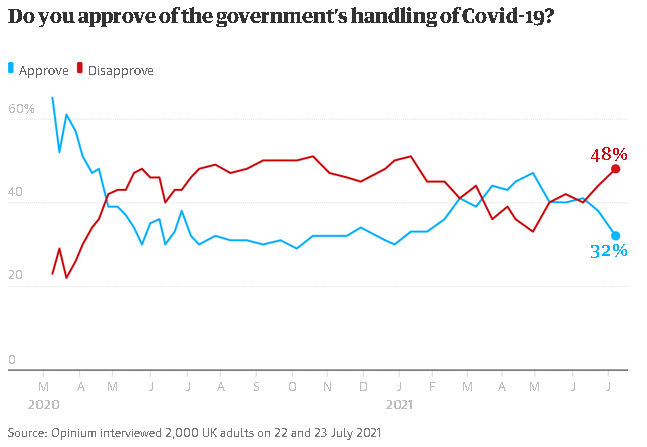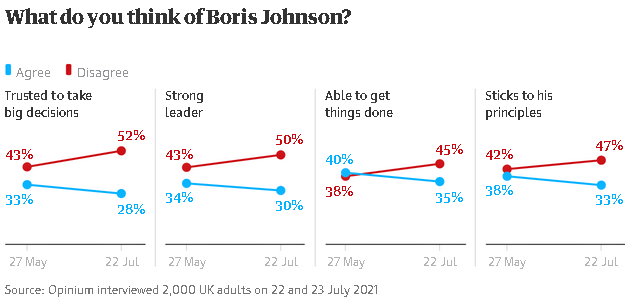
How England’s ‘pingdemic’ took a heavy toll on the Tories
Last weekend, as MPs prepared for their long summer holiday break from Westminster, a senior member of Boris Johnson’s cabinet had this to say about the Conservative government’s achievements in steering the country through the Covid-19 pandemic. “It seems incredible to me we are still ahead in the polls after the year we’ve had. I think that we have plenty to feel good about, don’t you?”
A week on, his choice of the word “incredible” seems to be the most apt. Within hours of making this assessment, and as freedom day approached, the health secretary for England, Sajid Javid, announced he had tested positive for Covid-19.
The previous day, Javid had been in meetings in Downing Street and in contact with Boris Johnson and the chancellor Rishi Sunak. Chaos ensued as No 10 at first said that Johnson and Sunak would not be self-isolating, like hundreds of thousands of Britons who had been “pinged” by the NHS app, because they were involved in a pilot scheme involving daily tests which allowed them to carry on with essential work.
Hours later, amid uproar, came a U-turn. The three politicians leading the country along what Johnson had promised would be an “irreversible” road to freedom went into isolation on the eve of freedom day.
 Sajid Javid’s positive Covid test led to Boris Johnson and Rishi Sunak going into self-isolation.
Sajid Javid’s positive Covid test led to Boris Johnson and Rishi Sunak going into self-isolation.
By the end of a chaotic week that was supposed to see a return to life as normal, the food industry was warning of empty supermarket shelves and trains were being cancelled as the word “pingdemic” entered the vocabulary.
The US warned its people not to come to the UK as it was too risky. Local government leaders were raising concerns about their ability to deliver key services such as bin collections, and to staff care homes because so many carers were absent.
Ministers at first said there would be no relaxation of the rules to allow the double-vaccinated to continue working in key sectors, only to buckle days later and announce that they would produce a limited list of key workers who would be exempted after all. This weekend talks are ongoing about extending the list, but many of those in the supposedly exempted sectors – including leaders of the food supply chain – were saying yesterday that they remained in the dark about the details.
Before they left for their summer holidays, worried groups of Tory MPs met in private at Westminster and relayed concerns about the lack of grip at the top of government and reported how companies in their own constituencies were on the brink of having to close down because of lack of workers. One senior members of the 1922 committee of Tory backbenchers said: “It is all completely insane. We are due to end the rule on self-isolation on 16 August for everyone. Why can’t we just bring forward the date and do so now to avoid causing untold economic damage?”
Advertisement
Senior ministers can perhaps take some limited comfort from opinion polls that still show the Conservatives comfortably ahead of Labour after a uniquely difficult 16 months. Today’s Opinium survey for the Observer puts the Conservatives eight points ahead of Labour, unchanged since a fortnight ago. Keir Starmer is struggling to make headway and will have much explaining to do to his party if he cannot eat into the Tories’ lead soon.
But the Conservatives’ overall headline lead is far from the whole story. Many MPs and activists in the party suspect the numbers do not reflect far less favourable realities below the surface.
Another YouGov survey for the Times yesterday showed that the Tory lead had fallen to just four points from 13 points during the past week. Other trends are clear in most of the polls. The public’s confidence in Johnson’s government to handle the pandemic and in the prime minister’s leadership abilities, which had been boosted by the vaccination rollout, are all spiralling downwards.
Opinium found that net approval of the government’s handling of the pandemic now stands at -16%, the lowest since the height of the second wave in January. Johnson’s own approval rating has fallen from -8 a fortnight ago to -13 now, with 34% approving of the way he is doing his job and 47% disapproving.
Tories will also be encouraged that Starmer is failing to make any real dent in the Tory lead, with an approval rating stuck on -6, still in negative territory, as it has been since the May local elections.
But dig deeper and the metrics for Johnson make for even grimmer reading. Over half of the voters (52%) think that he cannot be trusted to take big decisions, down from 43% in May, and 45% think he is unable to get things done, down seven points from May. As arguments over Brexit continue with the European Union, and as the UK’s chairmanship of the crucial Cop26 meeting on climate change in November approaches, 44% of people say he is unable to stand up for Britain’s interests abroad, with just 38% believing that he can.
The political fortunes of the two main parties have swung sharply back and forth during the pandemic. Early on, the Tories benefited, as the country backed the need for tough lockdown measures.
Then from spring last year onwards, Starmer and Labour prospered as chaotic handling of the PPE shortage, and failure to protect people in care homes among other fiascos, hurt Johnson’s administration. For much of this year the vaccine rollout delivered a bounce back for the Conservatives, which seemed to have endured until a few weeks ago.
But now there is deep and real unease inside the Tory party, with MPs warning that Johnson may struggle to bounce back again unless his administration can regain control of events.
If Covid-19 restrictions have to be reimposed in the autumn after all the prime minister’s pledges about their irreversibility, some even predict that his leadership could be under threat. Already dozens of Tory MPs are warning that they will be prepared to defeat their own government if it tries to push through plans for vaccine passports for people entering nightclubs.
As the Tory commentator and former adviser to the PM Tim Montgomerie put it, most Tory MPs “still want it to work for Johnson but have a fast declining confidence that it will”.
In addition to Covid, the critical tests for Johnson will come, Montgomerie says, in the autumn when the government has to face up to the post-pandemic challenges, including how to begin restoring order to the public finances ahead of the November spending review.
“It’s one thing having problems governing in a pandemic, but if they start mishandling other big issues, like the economy, that is a different matter,” he said.
A former Tory minister said: “If we were to go back into any form of lockdown there would be a huge furore. It would look like management and government by lockdown. We need to have a period when we show that we can manage the normal process of government.”
 Dominic Cummings speaking to Laura Kuenssberg last week.
Dominic Cummings speaking to Laura Kuenssberg last week.
Last week’s extraordinary BBC interview with Johnson’s former adviser Dominic Cummings, in which he claimed that there had been talk inside government of replacing the prime minister within days of his December 2019 election win because he had no plan for running the country, may have lacked the devastating impact Cummings had hoped. But plenty of his criticisms are shared on the Conservative backbenches and in the wider party.
Ryan Shorthouse of the Tory thinktank Bright Blue says that Johnson’s big ideas for a fairer country, and a greener world as yet lack definition or stamp of the prime minister himself. “Levelling up and net zero [emissions] are nothing new: they are just a rebrand of regeneration and decarbonisation, which all governments in recent decades have focused on. They are the right priorities, but the policies are still lacking – to make the agendas distinctively Johnsonian, but also – more importantly - successful,” he said.
“The government is running out of time. New seeds need to be planted now to make this country greener and more balanced in the decades ahead.”

Others on the right of the party would prefer Johnson to be pursuing more traditional Conservative policies of low taxes and less intervention by the state. But whether from left or right, the charge of lack of vision as well as grip, are commonplace.
Everyone at Westminster agrees that the first few months after MPs return in September will be crucial for Johnson, and perhaps equally so for Starmer. The fortunes of one could well affect the other, perhaps decisively. Starmer has ordered a number of personnel changes to his inner circle and will spend the summer trying to sharpen his messaging while touring the country talking to voters ahead of the party conference in Brighton.
Yesterday Starmer announced he had promoted his chief of staff Morgan McSweeney to be polls director as he “builds for the next election”. McSweeney will be replaced by former Treasury special adviser Sam White who worked for Alistair Darling during the Blair and Brown administrations. Labour is gearing up, hoping to exploit Johnson’s travails.
When politics returns in earnest after the summer break, both leaders will be under intense scrutiny. “The autumn conference season will be absolutely critical,” said one Tory MP. “They both have one hell of a lot to prove – and the fortunes of one could well decide the fate of the other.”

The government’s autumn challenges
Living with Covid
Boris Johnson used to promise that the lifting of restrictions this summer would be irreversible. But recently, with cases rising again, he has had to temper his optimism. The roll-out of the vaccination programme has not ended the Covid nightmare as he and his ministers suggested it would. The prospect of a fourth lockdown in the autumn is a real one. So far, the public has supported tough measures to keep people safe, but will their faith in Johnson’s government endure if he is forced to eat his words by bringing back restrictions yet again? For many Tory MPs another lockdown would be intolerable. It would almost certainly start talk among Conservatives about Johnson’s suitability to lead the party into the next election.
Spending review: paying the pandemic bills
The last 16 months have seen the government spend as never before. The rules of good housekeeping have been torn up to deal with the Covid emergency. According to the all-party public accounts committee, the cost of measures to deal with the pandemic was £372bn by May. In November, the chancellor, Rishi Sunak, has to begin restoring order to the public finances in a three-year spending review. Johnson has said his government will end austerity and “level up” the country. It is difficult to see how Sunak and Johnson can avoid unpopular decisions on everything from benefits to budgets for public services, including the NHS, pensions, social care and more.
Cop26: taking a lead on efforts to save the planet
From 31 October to 12 November, the UK will chair the Cop26 summit in Glasgow on climate change and global warming. Johnson and the UK government will be in the chair, keen to show we can still lead internationally. The Paris climate agreement in 2015 pledged that nations would try to limit temperature rises to less than 1.5C by limiting fossil fuel emissions, the principal cause of global heating. Covid has made the climate challenge even tougher as many countries prioritise their own economic recoveries over global efforts to save the planet. Failure in Glasgow will be seen as a disaster for the world, and one for which the UK will have to take some of the blame.
Social care
One of Johnson’s boldest claims on becoming prime minister was that he would reform social care, where PMs before him had failed. But, as yet, no plan has been forthcoming. The problems are partly structural (who will be in charge?) but also financial (who will pay?). The political cycle always impedes reform. If there is to be an election in 2023, it is getting too close for comfort for Johnson and Sunak to place painful realities before the electorate. Will the cost of paying for care of the elderly fall on the young, already hard hit by the pandemic, or on their seniors, from whom the Tories get most of their support. Will promised rises in pensions have to be ditched to pay the bill, or pledges not to raise income tax abandoned? Or will solutions to this urgent social problem be thrown into the long grass again? There is no easy answer.










